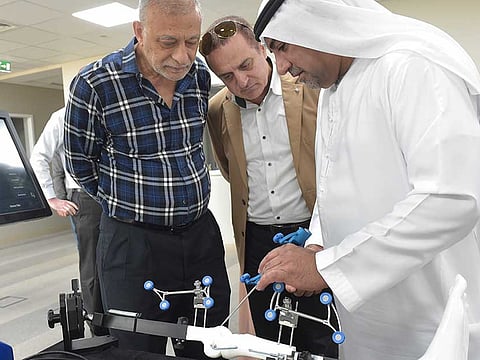First robotic knee replacement surgery takes place in Dubai
The robotic system works in conjunction with the surgeon’s hands to achieve the precise positioning of the knee implant

Dubai: After suffering from a knee condition for over two years, Emirati Ahmad Al Rais underwent the first successful robotic-assisted orthopaedic surgery in the Middle East on January 8.
The 47-year-old patient was one of two patients to undergo a partial/full knee replacement using the Navio Surgical System at Mediclinic City Hospital, announced the hospital during a media event on Wednesday.
The Navio system, also considered an artificial intelligence (AI) solution, offers total and partial knee replacements by ensuring precision and accuracy.
“Using a robotic-assisted hand piece such as the Navio Surgical System enables a surgeon to plan the surgery accurately intraoperatively, position the implants, and reduce the risk of errors during the procedure, while decreasing the length of time it takes for a patient to recover,” said Dr Ali Al Beloushi, who operated on the patient along with Dr Saeed Al Thani. Both doctors are consultant orthopaedic surgeons at Mediclinic City Hospital.
The patient, who suffered an injury on his left knee while playing football over two years ago, was able to move within a few hours after the two-hour surgery and is expected to make a full and active recovery.
“When I compare this surgery to my previous conventional surgery two years ago, I see a huge difference. I could not walk or even bend my knee one month and a half after the previous surgery. This time, I was able to walk two days after. I am using a walking stick for now, but I can also walk without it — and today I drove myself here alone,” said Al Rais.
The patient has started his first out of eight physiotherapy sessions, and is already going for daily walks to accelerate his recovery.
Robotics and AI
Referring to the surgery, the surgeons explained that the Navio system works in conjunction with the surgeon’s hands to achieve the precise positioning of the knee implant based on each patient’s unique anatomy.
This added level of accuracy can help improve the function, feel, and potential longevity of the partial knee implant, said Dr Al Beloushi.
It also provides robotic assistance through an advanced computer programme that relays precise information about the patient’s knee to a robotics-assisted hand piece used by the surgeon during the procedure.
By collecting patient-specific information, boundaries are established for the hand piece so the surgeon can remove the damaged surfaces of the knee, balance the joint, and position the implant with greater precision, explained Dr Al Beloushi.
“The robotics and AI enhance control of the surgical variables to improve outcomes including proper size, implant positioning, soft-tissue balance, and lower limb alignment,” he added.
He pointed out that recent studies showed that one per cent revision of the procedure is needed two years after the surgery — which is four times lower than that of the conventional technique of knee replacement.
“The future of health and science is going to revolutionise the way surgeons like myself work, as technology like this will help us lead in research and education when it comes to the science of knee replacement surgery,” said Dr Al Beloushi.
The patient’s surgery was covered by the Saa’da insurance programme for Emiratis. However, discussions are ongoing with general insurance companies about including such procedures to their packages.


